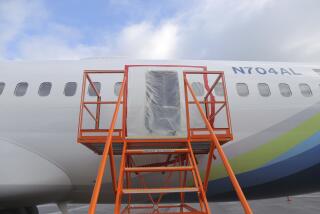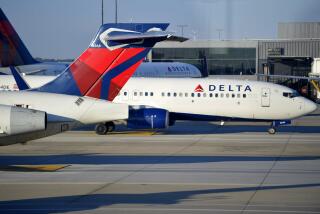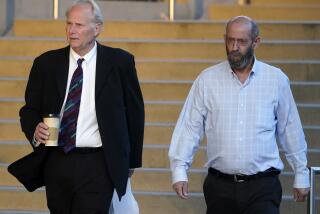Airline Crew Found Guilty of Flying Drunk
- Share via
CHICAGO — Three former Northwest Airlines pilots were found guilty in federal court in Minneapolis on Monday of flying while intoxicated.
In the first convictions under a federal law that cracks down on drinking and drug use by pilots, the jury found flight captain Norman Prouse, 51, of Conyers, Ga., co-pilot Robert Kirchner, 36, of Highlands Ranch, Colo., and flight engineer Joseph Balzer, 35., of Antioch, Tenn., guilty of flying a Boeing 727 with 91 passengers aboard from Fargo, N.D., to Minneapolis while drunk.
The pilots, who were released on bail, could face a maximum sentence of 15 years in prison and a $250,000 fine under the felony convictions. The punishments will be decided after authorities complete a pre-sentencing investigation.
“I came into this expecting the worst,” Prouse said after the verdicts were announced. “In that sense, I had no surprise.” His lawyer said he would appeal the conviction.
In his defense during the trial, Prouse did not contest evidence that he drank heavily the night before the flight. But he argued that, as an alcoholic who had been drinking for 35 years, he had built up a tolerance to alcohol and did not get drunk easily.
The three were arrested on March 8 after landing at Minneapolis-St. Paul International Airport after a bar customer in Moorhead, Minn., near Fargo, reported the heavy drinking to the Federal Aviation Administration.
A test taken after the plane landed showed Prouse had a blood-alcohol concentration of 0.13%, far exceeding the FAA’s .04% limit for flying. Kirchner showed a blood-alcohol concentration of 0.06%, and Balzer showed 0.08%.
Assistant U.S. Atty. Elizabeth de la Vega argued during the trial that, even though the pilots successfully completed their flight without incident, the tests showed that their skills had been seriously impaired.
According to bills from the Moorhead, Minn., lounge introduced as evidence, Prouse ordered 15 rum and Diet Cokes and Balzer and Kirchner shared seven pitchers of beer over a period of about six hours. In addition, there was testimony that other customers bought more drinks for the pilots.
The trial opened July 25. The jury began deliberations last Thursday.
Northwest Airlines, after conducting an eight-day investigation, fired the three men for violating the company’s 12-hour prohibition on drinking before flying. Prouse and Kirchner are appealing their dismissals. Balzer had no right to appeal because he was a probationary employee, Northwest spokesman Douglas Miller said.
A spokesman for the Air Line Pilots Assn. said Monday that Northwest, until last year, had an anti-drinking policy that was among the most punitive of any major airline. The tough policy may have driven pilots with drug and alcohol problems underground instead of encouraging them to seek help, he said.
“We think that it might not be coincidental that Northwest up until last year . . . was not cooperating with our (drug and alcohol rehabilitation) program,” said John Mazor, the union spokesman. “They more or less held on to the old-line attitude” toward drug and alcohol abuse.
Miller said the airline realized the inadequacy of its old policy and changed it to make it more “humane” in June, 1989.
“We’ve made some refinements in the program that . . . make it easier for pilots to come forward if they have a problem,” he said. The airline now pays for rehabilitation and does not force pilots to use vacation and sick time while enrolled in a rehabilitation program. In addition, pilots who go through rehabilitation are now grounded for six months instead of two years, he said.
After going through rehabilitation and regaining their licenses, pilots are subjected to regular testing, he said.
All of the major airlines “in varying degrees” encourage rehabilitation, Mazor said. Addiction is now viewed as a disease instead of a sign of weakness of character or moral degeneracy, he said.
Northwest Airlines became the butt of jokes by television comedians after the arrests, but Miller said Northwest did not suffer a loss of passengers. “We think the general traveling public realized that this is a very rare circumstance, and they realized we are a safe airline and an airline of integrity,” he said.
He said Northwest made no special attempt to counteract the negative publicity. “We suffered a black eye,” he said, “and we just tried to get through it the best we could.”
The law providing criminal penalties for operating a commercial plane, boat, train or bus while under the influence of alcohol or drugs was enacted in 1986 and amended in 1988.
A long-stalled bill introduced in the Senate would require random testing of pilots for alcohol abuse. The bill is opposed by the pilots’ union on constitutional grounds and because it is considered punitive, Mazor said.
More to Read
Sign up for Essential California
The most important California stories and recommendations in your inbox every morning.
You may occasionally receive promotional content from the Los Angeles Times.













